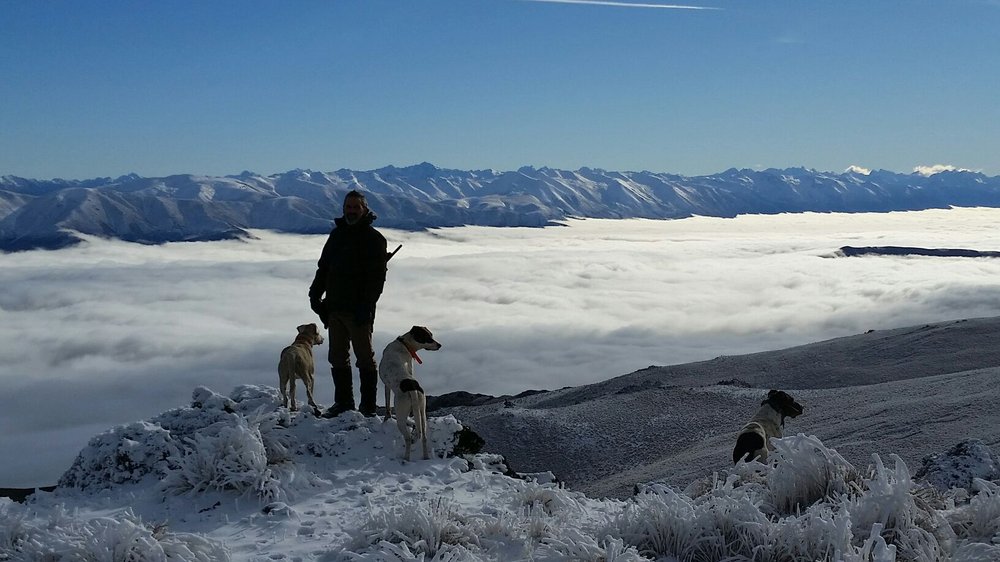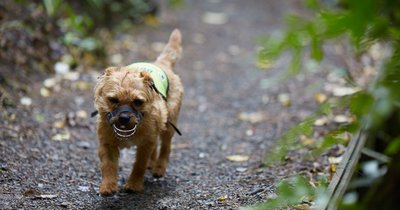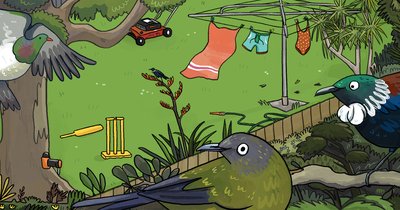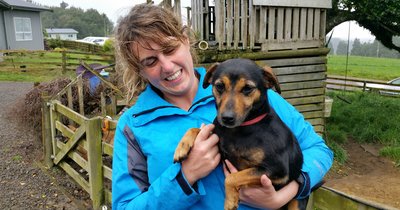New Zealand’s Department of Conservation Dogs Programme is known around the world for its excellence. We spoke with Scott Theobald, a biodiversity ranger who helped create the Conservation Dog Programme, putting New Zealand on the map.
Scott has worked with the Department of Conservation (DOC) for an impressive 22 years: 17 of these have been spent working with conservation dogs. Scott is currently working as a Ranger of Biodiversity Threats based in Te Manahuna/Twizel. There, he looks after Himalayan Tahr in Mount Cook National Park, and undertakes wallaby and rabbit control measures. Scott used to be a possum trapper in the forests of Northland – it was there he had the idea of introducing pest dogs to conservation work. While working in the bush, he noticed a lot of cats and stoats, so he approached his boss with the idea that pest dogs could be a great way to manage these trap-shy pests.
To gauge initial interest from the public, Scott organised a stall at the agricultural Field Day in Hamilton. “We had over 100 people sign up, and out of that 100, we found one dog handler.” Scott believes that a rigorous application process is crucial to make sure DOC hires the right handlers.
“It’s not just about liking dogs. You’ve got to know everything about them, what makes them tick, and they’ve got to know the bush.”
Full certification is a difficult process, and for the first few years, it was tough for Scott as he developed the Programme. However, after more handlers were hired, Scott and the team would bounce ideas off each other about how the dogs could be part of the solution to their pest problems.
Together, they made a video showing how Scott trained his dog to walk on the lead without pulling, and other various obedience tests. “Persuading the boss that we could do something amazing with these dogs was key.” He must have made a good case, because he was given the green light to develop the Conservation Dogs Programme. “I figured out that the main threats were stoats, rats, and cats, so I acquired three Terriers: a dog for each pest, and I made a full-time job out of it. We then decided to get the certification process sorted.” Scott thought they could score the process: 1 being bad and 5 being excellent. Then, he created 12 scenarios that he and his team would score the dogs on. “This is the same process we follow today to certify handlers and their dogs.” Thanks to his hard work, conservation dogs have fundamentally changed how we do conservation work in New Zealand. “The dogs are very important - they’re part of a toolbox, a vital part, and they’ve made a difference to conservation.” He’s stoked that Programme, once a “little thing up in Northland,” has come so far.
Big in Japan
While working in the bush, Scott noticed that his Fox Terrier was always cold. He thought maybe he could fix this by breeding a hairier dog with a Terrier. “I bred a Terrier with a Border Terrier, who have thick coats and friendly dispositions, and it was a total success. I’ve bred hundreds.” Initially Scott bred his superdogs for local conservation work, but the dogs were so good that he started sending them overseas to places like Japan, Australia, and the Falklands. He couldn’t believe the demand for his crossbred pups. “Here I was, just a pig hunter from Northland, and then suddenly I was able to do this amazing thing by contributing to conservation here in New Zealand and other countries.” For the last 7 years, Scott has visited Japan twice a year to certify conservation dogs and their handlers. However, this year will probably be Scott’s last: Japan is now breeding Scott’s dogs themselves, and they have their own certifiers too.
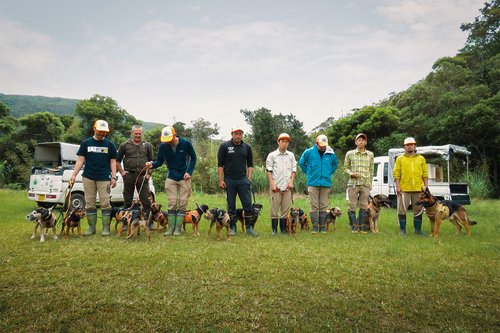
“When I go to Japan, I take the dogs out individually for the day and test them on all the certification points.” His confident dog handling skills haven’t gone unnoticed in Japan – in fact, he’s seen as a bit of a celebrity there. “I’m like the Crocodile Dundee of conservation work! And they treat me as such!” When his Japanese colleagues visit New Zealand, Scott often likes to take them into the bush with his pig dogs to show them the level of obedience they should demand from their own dogs - which no doubt further strengthens his well-earned “Crocodile Dundee” reputation!
Scott explains that Japan’s Conservation Programme focuses on eradicating the Indian Mongoose that was introduced to the Ryuku, Amami, and Okinawa Islands in the 1970’s to help control Japan’s deadly Habu snake population. The mongoose has had a major negative impact on agriculture and on native animals in mountainous areas instead of controlling the snakes.
When dog handlers in Japan heard about the work Scott was doing in New Zealand 10 years ago, they came to Otago to see how he ran the tracking trials and certification process.
“They were blown away - they loved the idea of using pest detection dogs instead of the traditional methods.”
Their Conservation Programme runs parallel to the New Zealand Programme, and Scott believes that their success is due to the fact that they’ve always had good funding from the Japanese government and support at management level within their conservation department.
R-E-S-P-E-C-T
So, what is it about New Zealand trained conservation dogs that makes other countries want to emulate what we do? Scott says it’s all about respect.“ Certification can be done by anyone, but I think it’s our attitude: Kiwis are practical people with farming roots who just get stuck into it.” So, our dogs are great, but our handlers are exceptional? Scott thinks so. “When I certify, it’s 60% handler and 40% dog. Our dogs are the best around, but the dogs don’t jump in the car and go off and train themselves. Handlers are the heroes that put the effort in.”
Scott stresses that it’s important for people to know that dog handlers are regular Kiwis who have families but are willing to sacrifice time away for the good of the country.
“Handlers sacrifice a lot. They spend a lot of time away from home, and some of them have young families.” Of course, the dogs often become part of these families. So much so, that while Scott believes certification is necessary, the true test is to go to the handler’s house and see how the dog behaves in a home environment. “If the dog’s sleeping on the couch, that’s a black mark. If it jumps on you, that’s another black mark. It’s all about respect: the dog has to respect its handler as well as the people around it.” Scott likes it when the dog becomes like a family member, but he stresses that there’s a fine line, and that this discipline is for the dog’s sake. “If you get a dog that’s used to sleeping on the couch and you take him to a sub Antarctic island where he has to stay outside, it’s just not fair on the dog.” For Scott, a dog lover is not necessarily a dog handler. And he believes that if handlers are respectful, fair and honest with their dogs, the dogs will work harder and better.
Kiwi excellence comes naturally
Instinct has a lot to do with conservation excellence. Scott says that great handlers have a natural way with their dogs, but that combined with years of experience, they become world-class. To keep operating at a world-class standard, Scott believes that keeping the quality of the dogs high is important. He doesn’t breed his own dogs anymore, and while he misses it, he does admit that it’s really intense work. “Every day you have to work them, every day you have to train them. And they’re species specific, so you have to be onto it the whole time, exercising them in the morning before work, and making sure your rat dog isn’t chasing stoats.”
As a Biodiversity Ranger, Scott now spends his time flying around helicopters through Mount Cook National Park.
“It’s been a fantastic journey for me. I loved the whole time of it and achieved what I set out to do. It was a great challenge, but it was time for me to move on for the good of the Programme, and let someone else have a go at running it.”
As for the partnership with Kiwibank, Scott believes the funding has helped immensely. “Money fixes most things and logistically, and we needed money to help get handlers and dogs around the country.”
The Conservation Dogs and their talented handlers are active all over New Zealand. You might be lucky enough to meet them at wharves, ferry terminals, island and mainland sanctuaries, in the national parks or perhaps even at your local Kiwibank branch so keep an eye out when you're exploring our backyard!
Want to find out more? Visit DOC's Conservation Dogs Programme at doc.govt.nz or check out Kiwibank’s social media channels.
